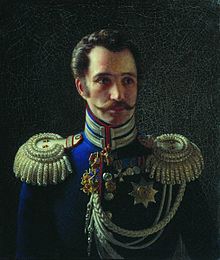L. V. Dubbelt

Leontiy Vasilievich Dubbelt (also transliterated as Dubelt, Russian: Леонтий Васильевич Дубельт) (1792–1862) was a Russian soldier (1807-1828) and subsequently a police-chief under Emperor Nicholas I (r. 1825–1855). Dubelt fought against the Grande Armée at the Battle of Borodino in 1812 and briefly came under suspicion of involvement in the Decembrist conspiracy of 1825. Colonel Dubelt resigned from the Imperial Russian Army in 1828 and joined the Corps of Gendarmes[1] - the Russian Empire's uniformed security police. He held senior rank from 1839 to 1856 in the feared Third Section and largely specialised in censorship.[2] In the course of his career he took part in secret-service cases involving writers and intellectuals[3][failed verification] such as Pushkin (posthumously investigated in 1837[4]), Lermontov (banished to the Caucasus in 1837[5]), Saltykov-Shchedrin (arrested and exiled in 1848[6]) and Turgenev (arrested and exiled in 1852).
References
[edit]- ^
Измозик, Владлен Семенович (2002). "Politicheskij rozysk vedet Tret'e Otdelenie (1826-1880 gody)" [The Third Section conducts political investigation (1826 to 1880)]. In Измозик, Владлен Семенович (ed.). ZHandarmy Rossii Жандармы России [Gendarmes of Russia]. Архив (Олма-Пресс) (in Russian). Saint Petersburg: ОЛМА Медиа Групп. p. 255. ISBN 9785765424490. Retrieved 5 September 2023.
В 1828 году полковник Дубельт вышел в отставку из-за столкновения с непосредственным начальством. [...] По рекомендации одного из руководителей III Отделения, А. Н. Мордвинова его приняли в Корпус жандармов.
- ^
Lincoln, W. Bruce (1978). Nicholas I, Emperor and Autocrat of All the Russias. Midland Books: No. 254. Bloomingtom: Indiana University Press. p. 320. ISBN 9780253340597.
Faced by his ministers' urgings to strengthen the bonds of censorship, and himself fearful of the revolutionary menace, Nicholas acted quickly to create the so called Menshikov Committee on 27 February to oversee both the journals and the censors. Only advocates of the strictest sort of censorship were included: Prince A. S. Menshikov, Baron Korf, Count A. S. Stroganov, D. P. Buturlin, General Dubbelt of the Third Section and P. I. Degai.
- ^ "Biographies" (PDF). Imperial Russia: A Reference Handbook. 2015-11-27. p. 185. Retrieved 2019-08-31.
- ^
"The Shadow of Pushkin-": Manuscripts, Books, Decorative Art, and Memorabilia from the A. F. Onegin Museum. Translated by Rainsford, S. Bologna: Editrice Compositori. 1997. p. 35. ISBN 9788877940773. Retrieved 21 September 2023.
Record of the so-called 'posthumous search' signed by Zhukovskii and the Chief of the Police Headquarters, L.V. Dubelt. <7th February 15th March 1837>.
- ^
Kirpotin, Valerij YAkovlevich (2002) [1939]. "Alexander Sergeyevich Pushkin (a biographical essay)". In The U. S. S. R. Society for Cultural Relations (ed.). Pushkin: A Collection of Articles and Essays on the Great Russian Poet A. S. Pushkin (reprint ed.). Honolulu, Hawaii: University Press of the Pacific. p. 63. ISBN 9780898759174. Retrieved 21 September 2023.
For his poem on the death of Pushkin Lermontov was exiled to the Caucasus, to the front, into the army engaged in war against the mountaineers.
- ^ Dolivo-Dobrovolʹskiĭ, Anatoliĭ Vadimovich; Kharlamova, Natalʹi︠a︡ Olegovna (2003). "1848". Sankt-Peterburg:khronika tryokh stoletij Санкт-Петербург: хроника трех столетий [Saint Petersburg: a chronicle of three centuries]. Istorii︠a︡ Rossii na nevskikh beregakh (in Russian). Moscow: ОЛМА Медиа Групп. p. 375. ISBN 9785765426654. Retrieved 21 September 2023.
